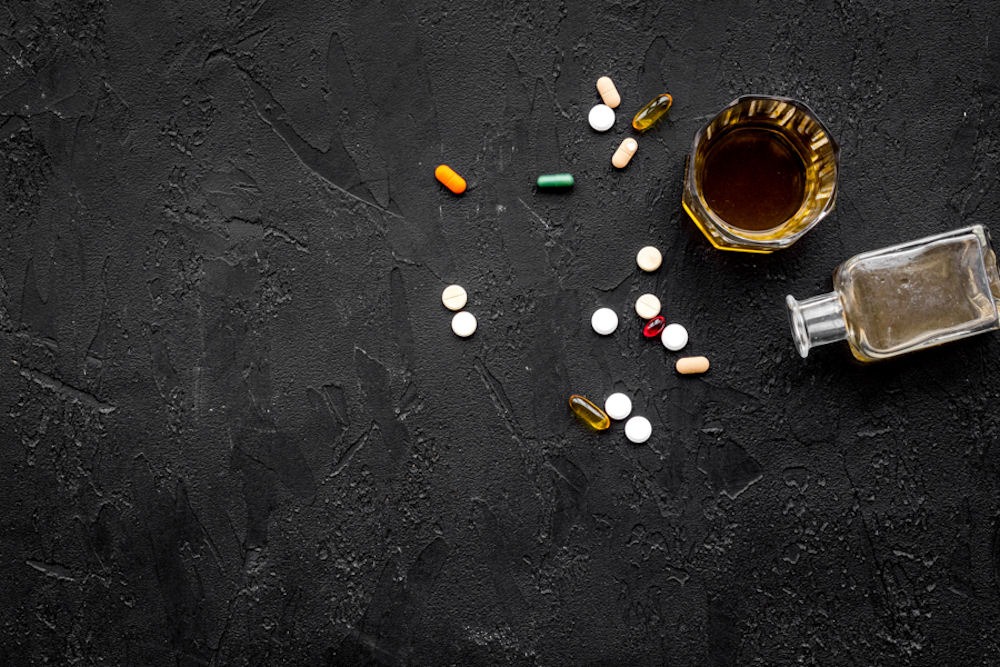When navigating the complexities of medication and substance use, one of the most pressing questions is whether certain drugs can be safely combined with alcohol. For individuals prescribed Trazadone, this question takes on additional urgency.
If you are wondering about the drug interaction between Trazodone and alcohol, this blog post aims to shed light on the interactions between Trazodone and alcohol and provide valuable insights for those struggling with addiction or dual diagnosis.
California Addiction Treatment is dedicated to helping individuals overcome alcohol addiction and dual diagnosis issues, offering comprehensive care in a serene environment in Huntington Beach. Read on to learn more about mixing Trazodone and alcohol, its risks, and the support available to those who need it.
Can You Mix Trazodone and Alcohol Together?
The short answer is no; mixing Trazodone and alcohol is not recommended. Both substances have a profound impact on the central nervous system and can amplify each other’s effects, leading to dangerous outcomes. This combination poses significant risks, particularly for those already vulnerable to addiction or mental health disorders.

What Interactions Does Trazadone Have with Alcohol?
Trazodone is an antidepressant commonly prescribed for depression and anxiety. It helps regulate neurotransmitters in the brain, contributing to mood stabilization. However, alcohol is a depressant that impacts the same brain chemicals and pathways. When combined, these substances can result in severe, unpredictable interactions.
Alcohol can undermine the effectiveness of Trazodone, making it harder for the medication to achieve its intended therapeutic effects. Additionally, both substances can cause drowsiness, dizziness, and impaired coordination, increasing the risk of accidents and injuries.
What Happens When You Mix Trazodone and Alcohol?
Mixing Trazodone and alcohol can have life-threatening consequences. Some of the most common include the following:
- Increased sedative effects: Both substances are central nervous system depressants, and combining them can result in excessive drowsiness, lethargy, and slowed reflexes. This increases the risk of falls or accidents and may cause individuals to have difficulty breathing or lose consciousness.
- Worsened mental health symptoms: Alcohol can exacerbate depression and anxiety symptoms by altering serotonin levels in the brain. When combined with Trazodone, this effect can be amplified, leading to increased feelings of hopelessness and despair.
- Risk of overdose: Combining Trazodone and alcohol significantly increases the risk of overdosing. Both substances can cause respiratory depression, reducing the body’s ability to breathe properly and leading to serious consequences.
- Liver damage: Both Trazodone and alcohol are metabolized in the liver, and long-term use or high doses can put a strain on this crucial organ. Combining these substances further stresses the liver, increasing the risk of liver damage or failure.
- Risky behavior: Alcohol can lower inhibitions and impair judgment, leading individuals to engage in potentially dangerous behaviors that they would not otherwise consider. This can put them at risk of accidents or harm themselves or others.
- Increased impairment: Trazodone and alcohol can both cause dizziness, blurred vision and slowed reaction times. When combined, these effects are intensified, making it dangerous to drive or operate machinery.
- Blackouts: Mixing Trazodone and alcohol can also lead to blackouts, a form of temporary amnesia where individuals have no memory of events that occurred while under the influence.
These effects can vary depending on the individual’s tolerance, the dosages involved, and other personal health factors. However, the risks are significant and can lead to life-threatening situations.
Should You Mix Alcohol and Trazodone Together?
Given the potential for severe interactions and adverse effects, mixing alcohol and Trazodone is not advisable. The risks far outweigh any perceived benefits, and the combination can compromise your physical and mental health. It’s essential to follow your healthcare provider’s guidance and avoid alcohol while taking Trazadone.
What Is Trazodone? What Is It Used For?
Trazadone is a prescription medication primarily used to treat major depressive disorder. It works by balancing certain chemicals in the brain, such as serotonin, which helps improve mood and emotional stability. In addition to its antidepressant properties, Trazodone is often prescribed for insomnia and anxiety, thanks to its sedative effects.
Patients taking Trazodone should adhere to their prescribed dosage and avoid any substances that could interfere with the medication’s effectiveness or safety. If you have questions or concerns about combining Trazodone with other substances, consult your healthcare provider for guidance.
How Much Alcohol Can You Drink on Trazodone?
It is strongly recommended to avoid alcohol entirely while taking Trazadone. Any amount of alcohol can interact with the medication, leading to intensified side effects and serious health risks. Trazodone and alcohol both impact the central nervous system, potentially leading to increased sedation, impaired motor skills, and heightened mental health issues.
Perhaps you feel that a small amount of alcohol wouldn’t pose a risk. To ensure your safety and the effectiveness of your treatment, however, abstaining from alcohol is the safest choice. Always heed your healthcare provider’s advice regarding alcohol consumption when prescribed Trazadone or any other medication.
How Long Should You Wait to Drink After Taking Trazadone?
If you have taken Trazodone, it’s crucial to wait until the medication has cleared your system before consuming alcohol. While the exact time can vary based on individual metabolism and dosage, a general rule of thumb is to wait at least 24 hours after your last dose. However, it’s always best to consult with your healthcare provider for personalized advice.
What to Do If You Can’t Stop Mixing Trazodone and Alcohol
If you find yourself unable to stop mixing Trazodone and alcohol, it may be a sign of an alcohol use disorder. This condition requires professional intervention and support to manage effectively. Persistent cravings and the inability to avoid alcohol despite knowing the risks indicate a deeper issue that needs addressing. Other symptoms of alcohol use disorder include the following:
- Drinking larger amounts or over a longer period than intended.
- Unsuccessful efforts to cut down or control alcohol use.
- Spending a significant amount of time obtaining, using, or recovering from alcohol.
- Craving, or a strong desire or urge to use alcohol.
- Failure to fulfill major role obligations at work, school, or home due to alcohol use.
- Continuing alcohol use despite persistent social or interpersonal problems caused by or exacerbated by the effects of alcohol.
- Giving up or reducing important social, occupational, or recreational activities because of alcohol use.
- Using alcohol in situations where it is physically hazardous.
- Continuing alcohol use despite knowledge of having a persistent or recurrent physical or psychological problem likely to have been caused or exacerbated by alcohol.
- Developing tolerance, requiring more alcohol to achieve intoxication or desired effect.
- Experiencing withdrawal symptoms when reducing or discontinuing alcohol use.
When someone exhibits a combination of these symptoms, it’s crucial to seek professional treatment to effectively address alcohol use disorder. Alcohol use disorder is a medical condition that can lead to significant physical and psychological harm if left untreated. Professional treatment offers a structured approach to recovery, through which individuals can receive personalized care, support, and guidance.
Treatment options may include therapy, medication, support groups, and detoxification programs, all tailored to the individual’s needs. By engaging in professional treatment, individuals can regain control of their lives and work towards long-term sobriety and mental well-being. It’s important for those affected to reach out to healthcare providers or addiction specialists, who can provide the necessary resources and support for recovery.
Alcohol Addiction Treatment at California Addiction Treatment
California Addiction Treatment offers specialized care for individuals struggling with alcohol addiction. Located in sunny Huntington Beach, our state-of-the-art facility provides a serene and supportive environment for recovery.
With JCAHO certification, we maintain the highest standards of care, ensuring that each patient receives personalized treatment tailored to their needs. Our services include the following:
- Medical detox: Our team of medical professionals provides safe and comfortable detoxification, helping individuals manage withdrawal symptoms and prepare for further treatment.
- Inpatient rehab/residential treatment: Our residential program offers intensive therapy and support in a structured environment, designed to address the underlying causes of addiction.
- Medication-assisted treatment (MAT): For individuals with alcohol use disorder, medications such as Naltrexone can help reduce cravings and manage withdrawal symptoms.
- Dual diagnosis treatment: We understand that alcohol addiction often co-occurs with other mental health conditions. Our dual diagnosis program addresses both issues simultaneously for comprehensive recovery.
At California Addiction Treatment, we are committed to helping individuals overcome their struggles with alcohol addiction and live healthier, happier lives. Our world-renowned staff is committed to helping you achieve sobriety and reclaim your life.
Dual Diagnosis Treatment in Huntington Beach, California
For individuals dealing with both mental health disorders and substance abuse, dual diagnosis treatment is essential. At California Addiction Treatment, we understand the complexities of dual diagnosis and offer comprehensive care to address both conditions simultaneously.
Dual diagnosis involves treating the mental health disorder and the substance abuse problem concurrently, ensuring a holistic approach to recovery. Our experienced team of professionals works closely with patients to develop individualized treatment plans that promote healing and stability.
Recover Today with California Addiction Treatment
 By understanding the risks associated with mixing Trazodone and alcohol, you can make informed decisions about your health and well-being. With the right support and treatment, recovery is within reach.
By understanding the risks associated with mixing Trazodone and alcohol, you can make informed decisions about your health and well-being. With the right support and treatment, recovery is within reach.
If you’re in Huntington Beach and struggling with the combined challenges of alcohol use and Trazodone, California Addiction Treatment is here to help. Our dedicated team offers compassionate care and effective treatment options to guide you on your path to recovery.
Take the first step towards a healthier, happier life. Reach out to California Addiction Treatment today and discover how we can support you in overcoming addiction and achieving lasting wellness.


 By understanding the risks associated with mixing Trazodone and alcohol, you can make informed decisions about your health and well-being. With the right support and treatment, recovery is within reach.
By understanding the risks associated with mixing Trazodone and alcohol, you can make informed decisions about your health and well-being. With the right support and treatment, recovery is within reach.

